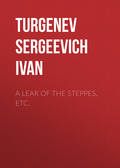
Иван Тургенев
Fathers and Sons
"In return, would you care to have a cigar?" called Bazarov.
"I should," replied Arkady.
The result was that when Peter returned to the koliaska he handed Arkady not only the matchbox, but also a fat black cigar. This Arkady lit at leisure, and then proceeded to diffuse around him so strong and acrid an odour of tobacco that Nikolai Petrovitch (a non-smoker from birth) found himself forced to avert his nose (though he did this covertly, for fear of offending his son).
A quarter of an hour later the vehicles drew up at the steps of a new wooden mansion, painted grey, and roofed with red sheet-iron. The mansion was Marino, or Novaia Sloboda, or, to quote the peasants' name, "Bobili Chutor."
IV
There issued on to the verandah to greet the arrivals no throng of household serfs – only a solitary girl of twelve. Presently, however, she was joined by a young fellow much resembling Peter, but dressed in a grey livery coat to which embossed, silver-gilt buttons were attached. This was Paul Kirsanov's valet. In silence he opened the door of the koliaska, and unhooked the apron of the tarantass; whereupon the three gentlemen alighted, passed through a dark, bare hall (the face of a young woman peered at them for a moment from behind a door), and entered a drawing-room upholstered in the latest fashion.
"So here we are at home again!" exclaimed Nikolai Petrovitch, taking off his cap, and shaking back his hair. "Let us have supper, and then for bed, bed!"
"Yes, something to eat would undoubtedly be welcome," remarked Bazarov as, yawning, he seated himself upon a sofa.
"Quite so; I will have supper served at once." Nikolai Petrovitch, for no apparent reason, tripped over his own feet. "And here comes Prokofitch," he added.
As he spoke entered a man of about sixty who, white-haired, and of thin, swarthy features, was wearing a cinnamon-coloured tail-coat with brass buttons and a crimson collar. He smiled with delight as he approached and shook hands with Arkady. Then, with a bow to the guest, he retired to the doorway, and folded his hands behind his back.
"So here is the young master, Prokofitch!" said Nikolai Petrovitch. "He is home at last. And how, think you, is he looking?"
"Very well, very well," the old man said with another smile. The next moment, however, he knit his shaggy brows, and suggested: "Shall I lay the table?"
"If you please, if you please." Nikolai Petrovitch turned to Bazarov.
"Before supper," he said, "would you care to go to your room?"
"I thank you, no. But please have my trunk conveyed thither, and also this wrap." And Bazarov divested himself of his cloak.
"Certainly. Prokofitch, take the gentleman's cloak."
The old butler received the garment gingerly, held it well away from him with both hands, and left the room on tiptoe.
"And you, Arkady?" continued Nikolai Petrovitch. "Do you not wish to go to your room?"
"Yes; for a wash I should be thankful," was Arkady's reply as he moved towards the door. At that moment it opened to admit a man of medium height who was dressed in a dark English suit, a fashionably low collar, and a pair of patent leather boots. This was Paul Petrovitch Kirsanov. Although forty-five, he had close-cropped grey hair of the sheen of new silver, and his sallow, unwrinkled face was as clear-cut and regular of outline as though carved with a light, fine chisel. Still retaining traces of remarkable comeliness, his bright, black, oblong eyes had a peculiar attraction, and his every well-bred, refined feature showed that symmetry of youth, that air of superiority to the rest of the world which usually disappears when once the twenties have been passed.
Drawing from his trouser pocket a slender hand the long, pink nails of which looked all the slenderer for the snowy whiteness of the superimposed cuff and large opal sleeve-link, he offered it to his nephew; after which, this prefatory European "handshake" over, he thrice kissed Arkady in the Russian fashion – that is to say, touched his nephew's cheek with his perfumed moustache, and murmured: "I congratulate you."
Next Nikolai Petrovitch presented to him Bazarov. Inclining his supple figure with a faint smile, Paul Petrovitch this time did not offer his hand. On the contrary, he replaced it in his pocket.
"I was beginning to think that you never meant to arrive," he said with an amiable hoist of his shoulders and a display of some beautiful white teeth. "What happened to you?"
"Nothing," replied Arkady, "except that we lingered a little. For the same reason are we as hungry as wolves; so pray tell Prokofitch to be quick, Papa, and I shall be back in a moment."
"Wait; I will go with you," added Bazarov as he rose from the sofa; and the two young men left the room together.
"Who is your guest?" asked Paul Petrovitch.
"A friend of Arkady's, and, according to Arkady's showing, a man of intellect."
"He is going to stay here?"
"He is."
"A long-haired fellow like that?"
"Certainly."
In that particular direction Paul Petrovitch said no more, but, tapping the table with his finger-nails, added:
"Je pense que notre Arkady s'est dégourdi.6 And in any case I am pleased to see him back again."
At supper little was said. In particular did Bazarov scarcely speak, though he ate heartily; and only Nikolai Petrovitch proved garrulous as he related various incidents in what he termed his "agricultural life," and gossiped of forthcoming administrative measures, committees, deputations, the need of introducing machinery, and other such topics.
For his part, Paul Petrovitch paced the room (he never took supper), and sipped a glassful of red wine, and occasionally interjected some such remark – rather, exclamation – as "Ah!" or "Oh, ho!" or "H'm!" Arkady's contribution consisted of a little St. Petersburg gossip, even though, throughout, he was conscious of a touch of that awkwardness which overtakes a young man when, just ceased to be a boy, he returns to the spot where hitherto he has ranked as a mere child. In other words, he drawled his phrases unnecessarily, carefully avoided the use of the term "Papasha,"7 and, once, even went so far as to substitute for it the term "Otety"8– though, true, he pronounced it with some difficulty. Lastly, in his excessive desire to seem at his ease, he helped himself to more wine than was good for him, and tasted some of every brand. Meanwhile Prokofitch chewed his lips, and never removed his eyes from his young master.
Supper over, the company dispersed.
"A queer fellow is that uncle of yours," Bazarov said to Arkady as, clad in a dressing-gown, he seated himself by his friend's bed, and sucked at a short pipe. "To think of encountering such elegance in the country! He would take a prize with his finger-nails."
"You do not know him yet," said Arkady. "In his day he was a leading lion, and some time or another I will tell you his history. Yes, many and many a woman has lost her head over his good looks."
"Then I should think that he has nothing to live on save memories," observed Bazarov. "At all events, there is no one here for him to enslave. I looked him over to-night, and never in my life have beheld a collar of such marvellous gloss, or a chin so perfectly shaven. Yet such things can come to look ridiculous, do not you think?"
"Yes – perhaps they can. But he is such an excellent fellow in himself!"
"Oh, certainly – a truly archangelic personage! Your father, too, is excellent; for though he may read foolish poetry, and though his ideas on the subject of industry may be few, his heart is in the right place."
"He is a man with a heart of gold."
"Nevertheless, did you notice his nervousness to-night?"
Arkady nodded as though to himself such a weakness was a perfect stranger.
"Curious indeed!" commented Bazarov. "Ah, you elderly Romanticists! You over-develop the nervous system until the balance is upset. Now, good-night. In my room there is an English washstand, yet the door will not shut! But such things (English washstands I mean) need to be encouraged: they represent 'progress.'"
And Bazarov departed, while Arkady surrendered himself to a sensation of comfort. How pleasant was it to be sinking to sleep in one's comfortable home, and in one's own familiar bed, and under a well-known coverlet worked by loving hands – perhaps those of his good, kind, tireless old nurse! And at the thought of Egorovna he sighed, and commended her soul to the Heavenly Powers. But for himself he did not pray.
Soon both he and Bazarov were asleep; but certain other members of the household there were who remained wakeful. In particular had Nikolai Petrovitch been greatly excited by his son's return; and though he went to bed, he left the candle burning, and, resting with his head on his hands, lay thinking deeply.
Also, his brother sat up in his study until nearly midnight. Seated in an ample armchair before a corner where a marble stove was smouldering, he had effected no alteration in his costume beyond having exchanged his patent leather boots for a pair of heelless, red felt slippers. Lastly, he was holding, though not reading, the latest number of Galignani, and his eyes were fixed upon the stove, where a quivering blue spurt of flame kept alternately disappearing and bursting forth again. Whither his thoughts were wandering God only knows; but that they were not meandering through the past alone was proved by the fact that in his expression there was a concentrated gloom which is never in evidence when a man's mind is occupied with memories and no more.
Finally, seated on a chest in a small room at the back of the house, and wearing a blue dressing-jacket and, thrown over her dark hair, a white scarf, was the girl Thenichka. As she sat there she kept listening, and starting, and gazing towards an open door which at once afforded a glimpse of an infant's cot and admitted the sound of a sleeping child's respiration.
V
Next morning Bazarov was the first to awake and go out of doors.
"Ah," thought he to himself as he gazed about him, "this is not much of a place to look at."
When apportioning allotments to his peasantry, Nikolai Petrovitch had found himself forced to exclude from the new "farm" four desiatins of level, naked land, and upon this space had built himself a house, quarters for his servants, and a homestead. Also, he had laid out a garden, dug a pond, and sunk two wells. But the young trees had fared badly, very little water had risen in the pond, and the wells had developed a brackish taste. The only vegetation to attain robust growth was a clump of lilacs and acacias, under the shade of which the household was accustomed to take tea or to dine. Within a few minutes Bazarov had traversed all the paths in the garden, visited the stables and the cattlesheds, and made friends with two young household serfs whom he happened to encounter, and with whom he set forth to catch frogs in a marsh about a verst from the manor.
"For what do you want frogs, barin?" asked one of the lads.
"To make them useful," replied Bazarov (who possessed a peculiar gift for winning the confidence of his inferiors, even though he never cozened them, but, on the contrary, always treated them with asperity). "You see, I like to open them, and then to observe what their insides are doing. You and I are frogs too, except that we walk upon our hind legs. Thus the operation helps me to understand what is taking place in ourselves."
"And what good will that do you?"
"This. That if you should fall sick, and I should have to treat you, I might avoid some mistakes."
"Then you are a doctor?"
"I am."
"Listen to that, Vasika! The barin says that you and I too are frogs. My word!"
"I don't like frogs," remarked Vasika, a barefooted boy of seven with a head as white as tow, and a costume made up of a grey blouse and a stiff collar.
"Why don't you like them?" asked Bazarov. "Do you think they will bite you? Nay! Into the water, my young philosophers!"
Nikolai Petrovitch too had left his bed, and, on going to visit Arkady, found him fully dressed; wherefore father and son proceeded to repair to the terrace, and there seated themselves under the shade of the awning. Amid nosegays of lilac, a tea-urn was simmering on a table by the balustrade, and presently there appeared upon the scene also the damsel who, on the previous night, had met the arrivals on the verandah. She announced in shrill tones:
"Theodosia Nikolaevna is not very well this morning, and cannot come to breakfast. So she has told me to ask you whether you will pour out tea for yourselves, or whether she is to send Duniasha?"
"I will pour it out myself," Nikolai Petrovitch replied with some haste. "Will you have cream or lemon in your tea, Arkady?"
"Cream," he replied. After a pause he continued:
"Papasha – "
Nikolai Petrovitch glanced confusedly in his direction.
"Yes?" said he.
Arkady lowered his eyes.
"Pardon me if my question should seem to you indiscreet," he began, "but, owing to your frankness of last night, I am emboldened to return it. You will not take offence, will you?"
"Oh no! Pray go on."
"Then I feel encouraged to ask you whether it – whether it is because I am here that she – that is to say, Thenichka – has not joined us at breakfast?"
Nikolai Petrovitch slightly averted his face.
"It may be so," he said at length. "At all events, I presume that – that she prefers, she prefers – in fact, that she is shy."
Arkady glanced at his father.
"But why should she be shy?" he inquired. "In the first place, you know my views" (he uttered the words with no little complacency), "and, in the second place, surely you cannot suppose that I would by a hair's breadth intrude upon your life and your habits? No; sure am I that never could you make a bad choice; and if you have asked this girl to reside under your roof, that is tantamount to saying that she has well deserved it. In any case, moreover, it is not for a son to summon his father to judgment – least of all for me, who possess a father like yourself, a father who has never restricted his son's freedom of action."
At first Arkady's voice had trembled a little, since not only did he feel that he was doing the "magnanimous," but also he knew that he was delivering something like a "lecture" to his father; but such an effect does the sound of his own voice exercise upon a human being that towards the end Arkady pronounced his words firmly, and even with a certain degree of empressement.
"I thank you, Arkady," Nikolai Petrovitch said faintly as his fingers began their customary perambulation of his forehead. "Nor is your conjecture mistaken, for if this girl had not deserved the invitation, I should not, of course, have – in other words, as you imply, this is no frivolous whim on my part. Nor need I have spoken of the matter, were it not that I desired you to understand that she might possibly have felt embarrassed at meeting you on the very day after your arrival."
"Then let me go and meet her," exclaimed Arkady with another access of "magnanimity" as he sprang from his chair. "Yes, let me go and explain to her why she need not shun me."
Nikolai Petrovitch also rose.
"Arkady," he began, "pray do me a favour. Hitherto I had not warned you that – "
But, without listening to him, Arkady darted from the terrace. For a moment or two Nikolai Petrovitch gazed after him – then, overcome with confusion, relapsed into a chair. His heart was beating rapidly. Whether or not he was picturing to himself a strangeness of future relations with his son; whether he was imagining that, had his son refrained from interfering, the latter might have paid him more respect in future; whether he was reproaching himself for his own weakness – it is difficult to say what his thoughts were. Probably in them there was a combination of the feelings just indicated, if only in the form of apprehensions. Yet those apprehensions cannot have been deeply rooted, as was proved by the fact that, for all the beating of his heart, the colour had not left his face.
Soon hasty footsteps were heard approaching, and Arkady reappeared on the terrace.
"I have made her acquaintance!" he shouted with a kindly, good-humoured, triumphant expression. "That Theodosia Nikolaievna is not well to-day is a fact; but also it is a fact that she is going to appear later. And why did you not tell me that I had a little brother? Otherwise I should have gone and kissed him last night, even as I have done this moment."
Nikolai Petrovitch tried to say something – to rise and to make an explanation of some sort; but Arkady cut him short by falling upon his neck.
"What is this? Again embracing?" said Paul Petrovitch behind them.
As a matter of fact, neither father nor son was ill-pleased to see him appear, for, however touching such situations may be, one may be equally glad to escape from them.
"At what are you surprised?" asked Nikolai Petrovitch gaily. "Remember that I have not seen Arkesha for several centuries – at all events, not since last night!"
"Oh, I am not surprised," said Paul Petrovitch. "On the contrary, I should not mind embracing him myself."
And Arkady, on approaching his uncle, felt once more upon his cheek the impression of a perfumed moustache. Paul Petrovitch then sat down to table. Clad in an elegant morning suit of English cut, he was flaunting on his head a diminutive fez which helped the carelessly folded tie to symbolise the freedom of a country life. At the same time, the stiff collar of the shirt (which was striped, not white, as best befitted a matutinal toilet) supported with its usual rigour an immaculately shaven chin.
"Well, Arkady?" said he. "Where is your new friend?"
"Out somewhere. He seldom misses going for an early morning walk. But the great thing is to take no notice of him, for he detests all ceremony."
"So I have perceived." And with his usual deliberateness Paul Petrovitch began to butter a piece of bread. "Will he be staying here very long?"
"Well, as long as he may care to stay. As a matter of fact, he is going on to his father's place."
"And where does his father live?"
"Some eighty versts from here, in the same province as ourselves. I believe he has a small property, and used to be an army doctor."
"H'm! Ever since last night I have been asking myself where I can have heard the name before. Nikolai, do you remember whether there was a doctor of that name in our father's division?"
"Yes, there used to be."
"Then that doctor will be this fellow's father. H'm!" And Paul Petrovitch twitched his moustache. "What exactly is your Bazarov?" he enquired of Arkady.
"What is he?" Arkady repeated smiling. "Do you really want me to tell you what he is, Uncle?"
"If you please, my nephew."
"He is a Nihilist."
"A what?" exclaimed Nikolai Petrovitch, while even Paul Petrovitch paused in the act of raising a knife to the edge of which there was a morsel of butter adhering.
"A Nihilist," repeated Arkady.
"A Nihilist?" queried Nikolai Petrovitch. "I imagine that that must be a term derived from the Latin nihil or 'nothing.' It denotes, I presume, a man who – a man who – well, a man who declines to accept anything."
"Or a man who declines to respect anything," hazarded Paul Petrovitch as he re-applied himself to the butter.
"No, a man who treats things solely from the critical point of view," corrected Arkady.
"But the two things are one and the same, are they not?" queried Paul Petrovitch.
"Oh no. A Nihilist is a man who declines to bow to authority, or to accept any principle on trust, however sanctified it may be."
"And to what can that lead?" asked Paul Petrovitch.
"It depends upon the individual. In one man's case, it may lead to good; in that of another, to evil."
"I see. But we elders view things differently. We folk of the older generation believe that without principles" (Paul Petrovitch pronounced the word softly, and with a French accent, whereas Arkady had pronounced it with an emphasis on the leading syllable) – "without principles it is impossible to take a single step in life, or to draw a single breath. Mais vous avez changé tout cela. God send you health and a general's rank, Messieurs Nihil – how do you pronounce it?"
"Ni-hi-lists," said Arkady distinctly.
"Quite so (formerly we had Hegelists, and now they have become Nihilists) – God send you health and a general's rank, but also let us see how you will contrive to exist in an absolute void, an airless vacuum. Pray ring the bell, brother Nikolai, for it is time for me to take my cocoa."
Nikolai Petrovitch did as requested, and also shouted for Duniasha; but, instead of the latter, there issued on to the terrace Thenichka in person. A young woman of twenty-three, she was pale, and gentle-looking, with dark eyes and hair, a pair of childishly red, pouting lips, and delicate hands. Also, she was clad in a clean cotton gown, a new blue kerchief was thrown lightly over her rounded shoulders, and she was carrying in front of her a large cup of cocoa. Shyly she placed the latter before Paul Petrovitch, while a warm, rosy current of blood suffused the exquisite skin of her comely face, and then she remained standing by the table, with lowered eyes and the tips of her fingers touching its surface. Yet, though she looked as though she were regretting having come, she looked as though she felt that she had a right to be there.
Paul Petrovitch frowned, and Nikolai Petrovitch looked confused.
"Good morning, Thenichka," the latter muttered.
"Good morning," she replied in a low, clear voice. Then she glanced askance at Arkady, and he smiled at her in friendly fashion. Finally she departed with a quiet step and slightly careless gait – the latter a peculiarity of hers.
Silence reigned on the terrace. For a while Paul Petrovitch drank his cocoa. Then he suddenly raised his head, and muttered:
"Monsieur Nihilist is about to give us the pleasure of his company."
True enough, Bazarov could be seen stepping across the flowerbeds. On his linen jacket and trousers was a thick coating of mud, to the crown of his ancient circular hat clung a piece of sticky marshweed, and in his hand he was holding a small bag. Also, something in the bag kept stirring as though it were alive. Approaching the terrace with rapid strides, he nodded to the company and said:
"Good morning, gentlemen! Pardon me for being so late. I shall be back presently, but first my captures must be stowed away."
"What are those captures?" Paul Petrovitch inquired. "Leeches?"
"No, frogs."
"Do you eat them? Or do you breed them?"
"I catch them for purposes of experiment," was Bazarov's only reply as carelessly he entered the house.
"In other words, he vivisects them," was Paul Petrovitch's comment. "In other words, he believes in frogs more than in principles."
Arkady threw his uncle a reproachful look, and even Nikolai Petrovitch shrugged his shoulders, so that Paul Petrovitch himself felt his bon mot to have been out of place, and hastened to divert the subject to the estate and the new steward.






